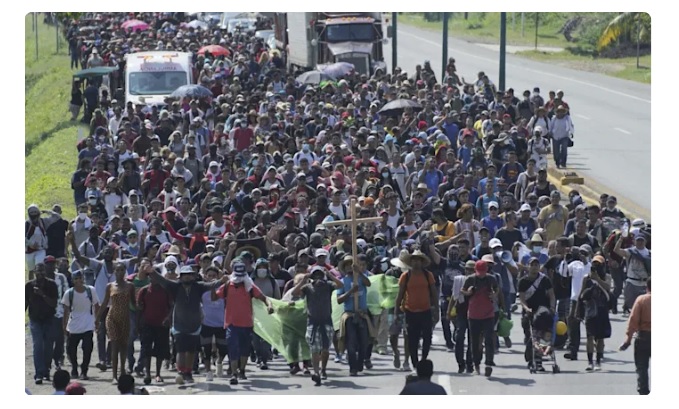Migrant Caravan Leaves Southern Mexico
U.S. bound migrant caravan is traveling through southern Mexico after soldiers attempted to disperse them. (Image courtesy of The Yucatan Times)
October 29, 2021
Last month, the Del Rio section of the U.S. and Mexico border gained international attention after approximately 15,000 Haitian migrants gathered underneath the international crossing between the two countries and overwhelmed U.S border patrol personnel.
While law enforcement officials have pushed these refugees back into Mexico, a migrant caravan of mostly Central Americans recently left the city of Tapachula in the southern state of Chiapas on October 23. Many of these migrants have been there for several months and are awaiting Mexican immigration officials to grant them the documents needed to freely enter the country. Some even claim that they feel imprisoned in Tapachula because officials of the National Institute of Migration (INM), Mexico’s main immigration agency, make it almost impossible for migrants to leave the city once they arrive.
Their goal is to first make it to Mexico City to ask President Andres Manuel Lopez Obrador to help them continue the journey north in order to seek asylum in the United States.
Many are continuing to disobey the Biden Administration’s message and still considering making the dangerous trek this year.
“Do not come. Do not come. The United States will continue to enforce our laws and secure our borders,” says Vice President Kamala Harris on a visit to Guatemala in June. “If you come to our border, you will be turned back.”
In recent years, Mexico has become a dangerous obstacle for migrants who need to travel through Mexican territory. Many if not most migrants that make it to the border report robberies, sexual assault, kidnappings, or extortion for money committed by drug cartels or other criminal groups that want to use them to their advantage.
In addition, Mexicans have developed increasingly hostile attitudes toward the migrant caravans. Some claim that there are men in the caravan who arrive in their cities drunk, while others claim that many of the migrants leave trash out in the streets the residents live in.
The same day the caravan left Tapachula, they ran into a roadblock of Mexico’s National Guard soldiers. The troops failed to stop the caravan of around two-thousand people and simply watched as they ran past them.
“More than a dream, America is a need,” says one Honduran migrant waiting in the Mexican border city of Tijuana for her asylum claim to be processed.

